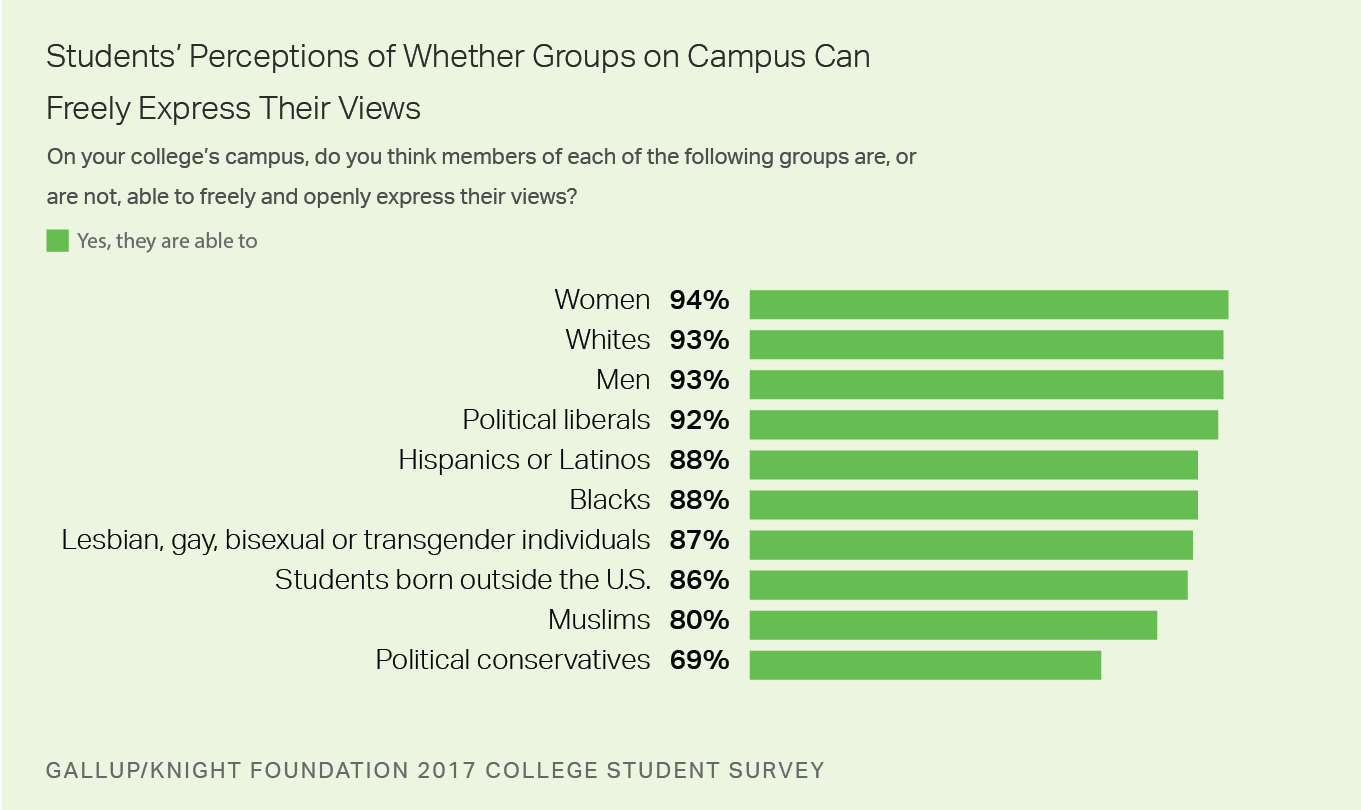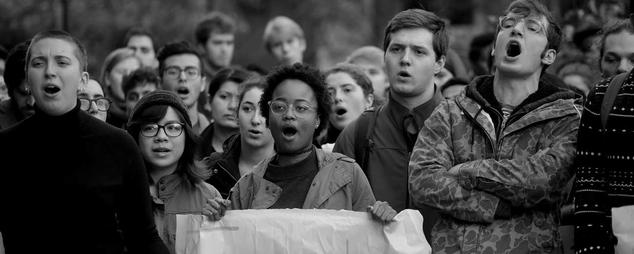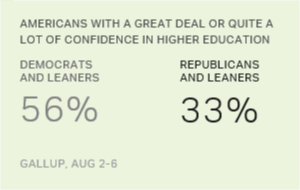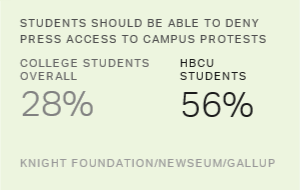Story Highlights
- 61%, up from 54%, say campus climate prevents people from speaking freely
- Students still prefer a campus environment that allows all speech
- Students perceive conservatives as less able to express their views
WASHINGTON, D.C. -- Sixty-one percent of U.S. college students agree that the climate on their campus prevents some people from expressing their views because others might find them offensive. In 2016, 54% of college students held this view.
| 2016 | 2017 | Change | |||||||||||||||||||||||||||||||||||||||||||||||||||||||||||||||||||||||||||||||||||||||||||||||||
|---|---|---|---|---|---|---|---|---|---|---|---|---|---|---|---|---|---|---|---|---|---|---|---|---|---|---|---|---|---|---|---|---|---|---|---|---|---|---|---|---|---|---|---|---|---|---|---|---|---|---|---|---|---|---|---|---|---|---|---|---|---|---|---|---|---|---|---|---|---|---|---|---|---|---|---|---|---|---|---|---|---|---|---|---|---|---|---|---|---|---|---|---|---|---|---|---|---|---|---|
| % | % | pct. pts. | |||||||||||||||||||||||||||||||||||||||||||||||||||||||||||||||||||||||||||||||||||||||||||||||||
| Strongly/Somewhat agree | 54 | 61 | +7 | ||||||||||||||||||||||||||||||||||||||||||||||||||||||||||||||||||||||||||||||||||||||||||||||||
| Strongly/Somewhat disagree | 46 | 38 | -8 | ||||||||||||||||||||||||||||||||||||||||||||||||||||||||||||||||||||||||||||||||||||||||||||||||
| Gallup/Knight Foundation 2017 College Student Survey | |||||||||||||||||||||||||||||||||||||||||||||||||||||||||||||||||||||||||||||||||||||||||||||||||||
These results are based on a 2017 Gallup/Knight Foundation survey of 3,014 randomly sampled U.S. college students about First Amendment issues. The survey is an update of a nationally representative 2016 Knight Foundation/Newseum Institute/Gallup survey on the same topic.
The full report is available for download here: https://kng.ht/freespeech18
Students' perceptions that their campus climate prevents people from speaking their minds are generally similar by gender, race and ideological self-identification. However, students who identify as Democrats (63%) or independents (62%) are somewhat more likely than Republican students (53%) to think the climate at their college deters speech. That is a reversal from 2016, when Republicans were more likely than Democrats to hold this view.
Other than Republicans, most key subgroups are more inclined now than in 2016 to agree the climate on their campus can inhibit expression. Independents and blacks show slightly greater increases, 13 and 14 percentage points, respectively, than other subgroups.
Reduced Majority of Students Prefer Campus That Allows All Types of Speech
While more students now agree that their campus climate stifles free speech, fewer students now (70%) than in 2016 (78%) favor having an open campus environment that allows all types of speech, even that which is offensive. In contrast, 29% of students now, up from 22% in 2016, would rather campuses be "positive learning environments for all students" by prohibiting certain speech that is offensive or biased.
Most major subgroups of students -- except Republicans -- have become at least slightly less supportive of open campus environments than they were in 2016.
Students Less Likely to Think Conservatives Can Freely Express Their Views
When students perceive the campus climate as deterring certain people from speaking their minds, they may have conservative students in mind more than others. Sixty-nine percent of college students believe political conservatives can freely and openly express their views on campus. While still a majority, it is far less than the 92% who say the same about political liberals. Between 80% and 94% of students believe other campus groups, including many that have historically faced discrimination, can freely express their views.

Notably, students on both the left and right of the political spectrum tend to think conservatives are less able than other groups to express their views on campus. Sixty-six percent of liberal students and 63% of conservative students believe political conservatives at their college can freely express their views; 68% of Republicans and 67% of Democrats say the same.
These same subgroups also hold similar opinions about whether politically liberal students can openly express their views. At least nine in 10 Republicans, Democrats, liberals and conservatives believe this is the case.
The survey explored a number of First Amendment issues on college campuses, including how students balance respect for free speech rights versus the value of inclusion and diversity. Among other key findings are:
-
Majorities of college students believe protecting free speech rights (56%) and promoting an inclusive society welcoming of diverse groups (52%) are extremely important in a democracy. When asked to choose which is more important, they tilt toward inclusion over free speech, 53% to 46%.
-
Although they say they prefer open campus environments, students also favor certain policies that may restrict expression, including campus policies prohibiting the use of slurs or other language that is intentionally offensive (73%), banning costumes that stereotype racial or ethnic groups (60%) and establishing designated "free speech zones" on campus (83%). They are divided on instituting speech codes -- codes of conduct that restrict biased speech -- with 49% in favor and 51% opposed.
-
One in four college students say they have personally felt uncomfortable on campus because of comments they heard about their race, ethnicity or religion. Black (43%) and Jewish students (38%) are among the subgroups most likely to say they have felt uncomfortable. Republicans (17%) are the least likely major subgroup to say they have felt uncomfortable.
-
Just 28% of students favor colleges canceling invitations to campus speakers because some students oppose the invitation. However, 69% favor colleges canceling planned speeches because of concerns about violent protests.
-
Although the majority of students oppose college students using violence or shouting down speakers to prevent controversial speakers' messages from being heard, 10% say violence and 37% say shouting down speakers are "acceptable" at least sometimes.
-
By 57% to 43%, students say most discussion of political or social issues at their college takes place online through social media rather than in classrooms and other public areas of campus.
-
Students increasingly believe that social media stifles free speech because people are afraid of being attacked (59%) or "blocked" (60%) by those who disagree with their views.
Implications
College campuses have a long history of political activism and expression. Some of that expression -- by students, professors or invited speakers -- has had negative repercussions, from milder forms like making people feel uncomfortable to more extreme forms like the violence that occurred in 2017 at the University of California, Berkeley and the University of Virginia.
College students generally value the ideals of free speech guaranteed by the First Amendment and endorse the idea of open campus environments. Whether colleges are creating such environments is unclear; students' increasing belief that their campus climate deters free speech suggests they may not be. But college students' sometimes inconsistent or conflicting opinions on free speech issues underscore the challenges and complexities that can arise between respecting student rights and making sure all students feel safe and respected on campus.
Survey Methods
These results are based on telephone interviews conducted Nov. 1-Dec. 10, 2017, with a random sample of 3,014 undergraduate students attending four-year U.S. colleges full time. For results based on the total sample of college students, the margin of sampling error is ±2 percentage points at the 95% confidence level. All reported margins of sampling error include computed design effects for weighting.
For this study, Gallup randomly sampled U.S. four-year colleges that were stratified according to enrollment, private or public control, and region of the country. All sampled colleges were contacted and asked to provide a random sample of their undergraduate students. Thirty-nine colleges provided samples, including 25 public and 14 private institutions, six from the East, 12 from the Midwest, 15 from the South and six from the West. Ten colleges had enrollments of 10,000 students or more, 12 had enrollments between 5,000 and 10,000 students, and 17 had enrollments of less than 5,000.




